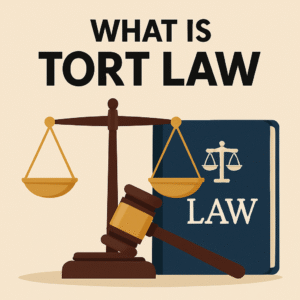
🔍 Introduction
If someone causes you harm—physically, emotionally, or financially—and it’s not a crime or a contract dispute, you may have a case under tort law. In the U.S. legal system, tort law allows people to seek compensation for personal injuries and damages caused by others. It holds individuals, companies, and even governments accountable for wrongful conduct.
In this guide, we break down the core of U.S. tort law in 2025: what it means, how it works, its different types, and how it may impact your rights.
Last Updated: June 23, 2025
Author: Nahyan | UsLawGuide.net
🔒 What Is Tort Law?
Tort law is a branch of civil law that deals with wrongful acts causing injury or harm to a person, their property, reputation, or rights.
In tort cases, the injured party (“plaintiff”) sues the person or entity allegedly responsible (“defendant”) to recover damages. These may be for:
- Medical expenses
- Pain and suffering
- Lost wages
- Property repair/replacement
Unlike criminal law, which punishes wrongdoers on behalf of the state, tort law is about compensation, not punishment.
🤜 Types of Torts in 2025
1. Negligence (Most Common)
Occurs when someone fails to act with reasonable care, leading to harm.
Examples:
- Car accidents caused by distracted driving
- Medical malpractice
- Slip-and-fall injuries at unsafe stores
2. Intentional Torts
Involve actions done deliberately to harm another person or their property.
Examples:
- Assault or battery
- False imprisonment
- Defamation (libel/slander)
3. Strict Liability Torts
Applies even when the defendant didn’t act negligently or intentionally—used in dangerous activities or defective products.
Examples:
- Injuries from unsafe products (product liability)
- Harm from keeping wild animals
- Explosives or toxic chemicals
⚖️ Elements of a Tort Case
For a plaintiff to win a tort case, they must usually prove these four elements:
- Duty: The defendant owed a legal duty to the plaintiff
- Breach: That duty was breached
- Causation: The breach directly caused harm
- Damages: The plaintiff suffered actual injury or loss
🔄 Recent Developments in Tort Law (2025)
- AI and Autonomous Vehicles: Courts are expanding tort theories to assign liability for self-driving car crashes and AI-related damages.
- Social Media Liability: Defamation and emotional distress claims are increasingly filed against platforms for user-generated content.
- Environmental Torts: More cases are emerging against corporations for environmental harm under public nuisance and strict liability.
❓ Frequently Asked Questions
Q: Is a tort the same as a crime?
➡ No. Crimes are prosecuted by the government. Torts are civil claims filed by private individuals for compensation.
Q: Can I sue for emotional distress?
➡ Yes. Emotional distress is recognized in both negligence and intentional tort cases.
Q: What’s the time limit for filing a tort case?
➡ This depends on your state. Most torts must be filed within 1 to 3 years of the injury.
Q: Do all torts involve physical injury?
➡ No. Many involve financial loss, damage to reputation, or emotional harm.
⚠️ Disclaimer
This article is for general information and not legal advice. Tort laws and filing deadlines vary by state. Consult a licensed attorney for advice specific to your situation.
🔗 Internal & External Links
External:
Internal (uslawguide.net):